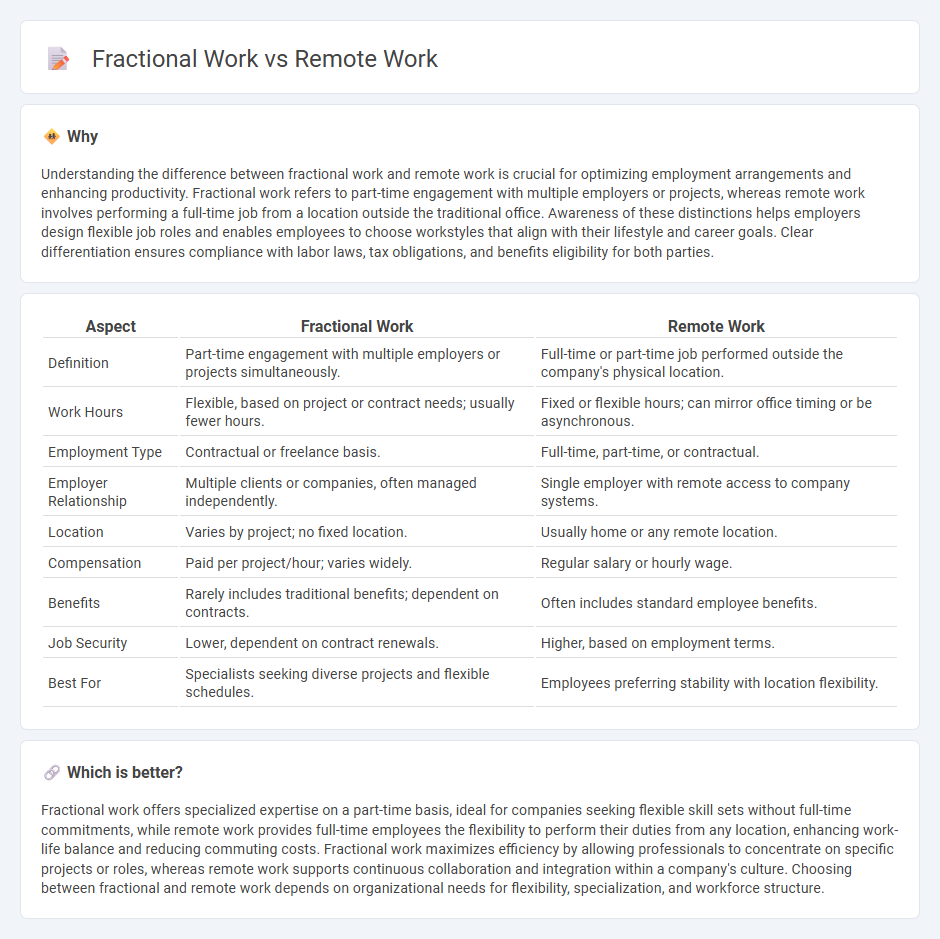
Fractional work offers employees the opportunity to contribute their expertise to multiple companies on a part-time basis, optimizing flexibility and diverse skill application. Remote work enables professionals to perform their responsibilities from any location, leveraging digital connectivity to enhance productivity and work-life balance. Discover more about how fractional and remote work models are transforming modern employment.
Why it is important
Understanding the difference between fractional work and remote work is crucial for optimizing employment arrangements and enhancing productivity. Fractional work refers to part-time engagement with multiple employers or projects, whereas remote work involves performing a full-time job from a location outside the traditional office. Awareness of these distinctions helps employers design flexible job roles and enables employees to choose workstyles that align with their lifestyle and career goals. Clear differentiation ensures compliance with labor laws, tax obligations, and benefits eligibility for both parties.
Comparison Table
| Aspect | Fractional Work | Remote Work |
|---|---|---|
| Definition | Part-time engagement with multiple employers or projects simultaneously. | Full-time or part-time job performed outside the company's physical location. |
| Work Hours | Flexible, based on project or contract needs; usually fewer hours. | Fixed or flexible hours; can mirror office timing or be asynchronous. |
| Employment Type | Contractual or freelance basis. | Full-time, part-time, or contractual. |
| Employer Relationship | Multiple clients or companies, often managed independently. | Single employer with remote access to company systems. |
| Location | Varies by project; no fixed location. | Usually home or any remote location. |
| Compensation | Paid per project/hour; varies widely. | Regular salary or hourly wage. |
| Benefits | Rarely includes traditional benefits; dependent on contracts. | Often includes standard employee benefits. |
| Job Security | Lower, dependent on contract renewals. | Higher, based on employment terms. |
| Best For | Specialists seeking diverse projects and flexible schedules. | Employees preferring stability with location flexibility. |
Which is better?
Fractional work offers specialized expertise on a part-time basis, ideal for companies seeking flexible skill sets without full-time commitments, while remote work provides full-time employees the flexibility to perform their duties from any location, enhancing work-life balance and reducing commuting costs. Fractional work maximizes efficiency by allowing professionals to concentrate on specific projects or roles, whereas remote work supports continuous collaboration and integration within a company's culture. Choosing between fractional and remote work depends on organizational needs for flexibility, specialization, and workforce structure.
Connection
Fractional work and remote work are interconnected by offering flexible employment models that maximize productivity while accommodating diverse schedules and locations. Fractional work allows professionals to contribute part-time or project-based expertise, often delivered through remote platforms, enabling organizations to access specialized skills without geographical constraints. This synergy enhances workforce agility, reduces overhead costs, and supports work-life balance in the evolving job market.
Key Terms
Flexibility
Remote work offers flexibility by allowing employees to perform tasks from any location, adapting their schedules to personal needs while maintaining consistent job hours. Fractional work increases flexibility by enabling professionals to contribute specialized skills on a part-time or project basis, optimizing time for both employer and worker. Explore the nuances of remote versus fractional work to determine the best flexibility model for your career or business.
Commitment Level
Remote work typically involves a full-time commitment where employees consistently engage with a single company from a different location, ensuring continuous collaboration and integration within the team. Fractional work offers part-time, specialized services across multiple clients, allowing professionals to allocate specific hours or projects without full-time obligations. Explore the distinct commitment levels and benefits of remote and fractional work to determine the best fit for your career goals.
Employment Structure
Remote work involves employees performing their roles full-time or part-time from locations outside a traditional office, maintaining a standard employment contract with consistent hours and responsibilities. Fractional work refers to hiring professionals on a part-time or project basis, often across multiple organizations, offering specialized skills without full-time commitment. Explore how these employment structures can optimize workforce flexibility and cost-efficiency for your business.
Source and External Links
What Is Remote Work? Ultimate Guide | Wrike - This guide provides an overview of remote work, including its benefits, challenges, and tips for transitioning to a remote work environment.
What is the definition of remote work? - OPM.gov - This resource defines remote work as a flexible arrangement where employees work at an alternative site, not regularly at the agency's office, under a written agreement.
Remote Work: Jobs, Companies & Virtual Teams - Remote.co - Offers a platform to discover thousands of remote and hybrid job opportunities across various fields.
 dowidth.com
dowidth.com